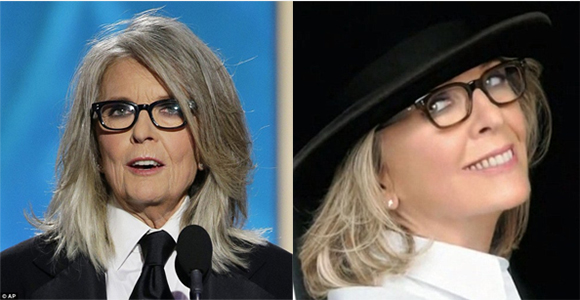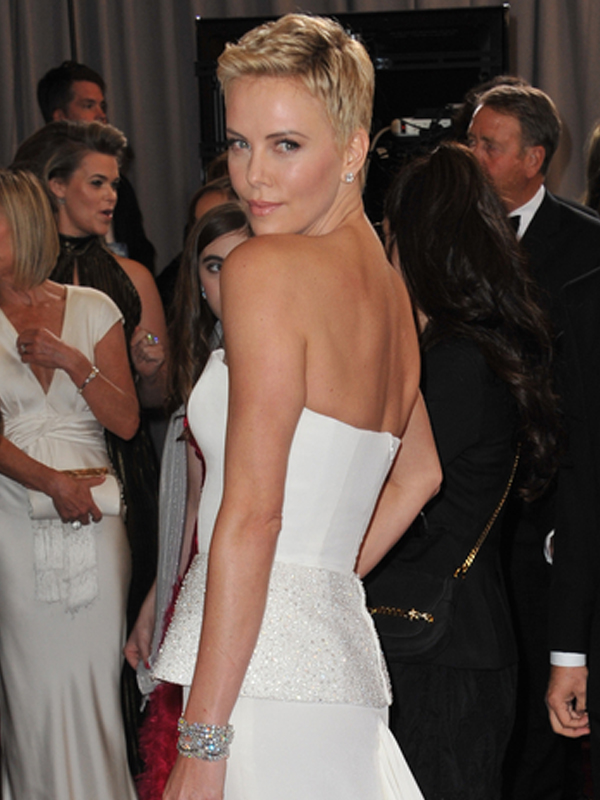We Photoshop every day, all the time. Not with actual Photoshop technology (because most of us are true poors), but with Instagram, and apps, and the things we use to make ourselves look awesome. Honestly, I'm okay with it. There are nights where I feel (and look, because I am an adult human who gets tired and looks accordingly) like a big bag of garbage, and I give thanks to my blessed friends for choosing a photo filter that doesn't make me look like a washed-out corpse when they post a picture of us. That's fine. I'm okay with that kind of Photoshop. But I'm not okay with the Photoshop (or more specifically, airbrushing), that L'Oreal used to erase all traces of character from Diane Keaton's face ast week.
During a commercial break, L'Oreal found themselves in hot water when, minutes after Diane Keaton appeared onstage at the Golden Globes (free of Botox or plastic surgery), they aired an ad featuring the veteran actress — with absolutely no trace of wrinkles, lines, or signs of aging. Afterwards, a brand spokesperson offered that the ad was actually developed in the US and is a few years old — but that seemed weird because we all know high-quality commercials like that didn't exist in 1976, when Ms. Keaton appeared to have been cast.

And this isn't on Diane Keaton. Diane Keaton is earning cash-money, working hard, and living her life. Just like Lena Dunham was living her life when she landed the cover of Vogue this month, only to have Jezebel exchange $10 000 for her "untouched" photos. To be honest, that was some fucked up shit. I don't know who was hanging out in the Jezebel office that day, but if that's the way they're going do business, how about offering all of us $10 000 for our "untouched" Instagram photos? Or better yet, why not invest that $10 000 in many copies of Vogue and Elle that have put creative, funny, talented women on their February covers. That way, instead of us screaming into the void about how funny/unique/cool/creative women deserve magazine covers in addition to models and actresses we've seen many times before, we'll have them to throw at anybody who argues otherwise. ("You see this? Read it! Then watch their shows! NOW LET'S GET LAVERNE COX ON NEXT! WHO'S WITH ME!")
But see, our reliance on Photoshop and airbrushing has made things tricky. Tricky because are all a little bit vain (or a lot vain, depending on what think piece you're reading), and we like to look our best. Look at us posing for Instagram! Look at us applying filters! Look at us trying to be amazing! Who's fault is it? Ours? The media's? Photoshop's? This is the stuff Masters thesis papers are written on. But because this isn't one of those, I'll throw this out there: it's merely a continuation of the storybook fantasy.
The idea of seeming flawless is something that's been ingrained in us since before our great, great, great, great grandparents were born. Women have been objectified, prized, idolized, harassed, abused, married off (plus more), all depending on their ability to look a certain way. We know this because it's tricked down to us, and even in 2014 we're deigning to fit an image that doesn't exist. At all. Yes, despite the magazines and commercials that perpetuate this fantasy, physical flawlessness — in real life — does not exist. It requires technology. It requires Photoshop. It requires airbrushing. It requires rebuilding a person using makeup, clothes, Spanx, extensions, and angles. Nobody walking down the street looks like somebody in a magazine. And why? Because the people in those magazines are just a version of that person in real life. It's the storybook version — the person we'd see in movies or on television. They're playing characters, and acquiring pre-character photos of, say, Lena Dunham, without her permission isn't exactly going to make them go away. (They're going to make anyone who paid for those photos seem like bullies who ruin somebody's victory.)
So what will make them go away? Nothing — at least not for a while. If you think Anna Wintour is going to announce a Photoshop-free issue just to appease us, we've got another thing coming. But we can change our mindsets, and our approaches to the fashion and beauty industries. We can not only examine what they're trying to sell to us, but how they're trying to sell to us. (Like, why would any of us NOT buy a L'Oreal product because Diane Keaton has wrinkles? She's 68! I'd be more alarmed (and am) by a 68-year-old who has no wrinkles at all. Those are badges of honour. That woman has lived.) We can begin to accept the way we look, and refuse to compare ourselves to women on TV and in publications who've been built from the ground up for an eight-hour shift. We can remember the description of photo shoots in Mindy Kaling and Tina Fey's memoirs, where they explain how in reality, none of the clothes fit, they're pinned to high heavens, and it's the genuine worst. We can remember that the way somebody looks in a magazine doesn't affect us whatsoever, and if anyone were to demand we look a certain way because they saw it in a magzine, they can be banished from life forever, because they are garbage people.
More importantly, we can challenge. Challenge in the way Twitter called out L'Oreal on Golden Globes night — not challenge in, "Please sneakily send us the photos of a woman who's entitled to have her editorial depicted the way it was printed, but we don't care, send them to us anyway." (What did that even accomplish? Proving that Photoshop was used? I mean, like, NO WAY. THIS IS BRAND NEW INFORMATION THANK GOD WE KNOW NOW.) Instead, we can challenge interviewers who ask actors how they fit into their dress. We can challenge commercials for ads that make us feel we "need" to use a product or risk not being a complete or "flawless" woman without it. We can banish "flawless" from our vocabularly unless we are talking about Meryl Streep. We can buy magazines that put wonderful women who are changing the world on the cover. We can speak up when something seems like bullshit, and encourage our friends to do the same. We can boycott brands or publications. We can be activists. But before we do all that, we have to remind ourselves: our worth is not determined by the images we see in fashion magazines. Those magazines are a storybook, and those characters aren't real. Photoshop isn't the problem — the way we use it and why we use it is.
Adjust our approach to Photoshop, and it won't be the crutch it's become. Or at the very least, our adjustments can finally defeat the myth of "flawlessness." Now that's a editorial story I'd like to see.












